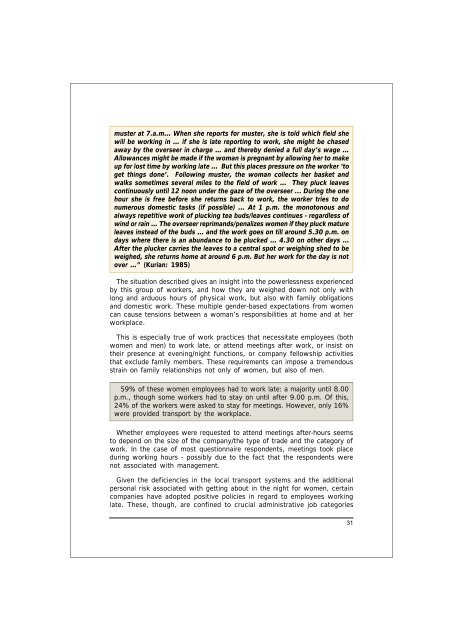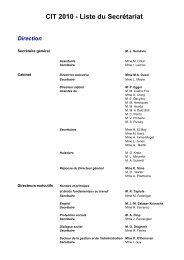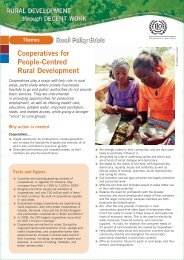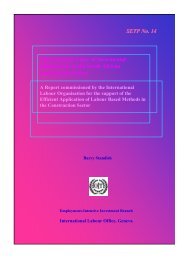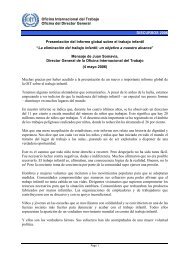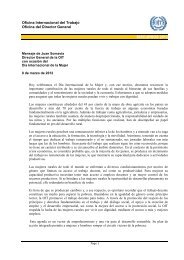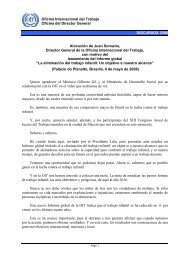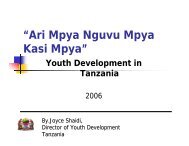Beyond Glass Ceilings and Brick Walls - International Labour ...
Beyond Glass Ceilings and Brick Walls - International Labour ...
Beyond Glass Ceilings and Brick Walls - International Labour ...
You also want an ePaper? Increase the reach of your titles
YUMPU automatically turns print PDFs into web optimized ePapers that Google loves.
muster at 7.a.m… When she reports for muster, she is told which field she<br />
will be working in … if she is late reporting to work, she might be chased<br />
away by the overseer in charge … <strong>and</strong> thereby denied a full day’s wage …<br />
Allowances might be made if the woman is pregnant by allowing her to make<br />
up for lost time by working late … But this places pressure on the worker ‘to<br />
get things done’. Following muster, the woman collects her basket <strong>and</strong><br />
walks sometimes several miles to the field of work … They pluck leaves<br />
continuously until 12 noon under the gaze of the overseer ... During the one<br />
hour she is free before she returns back to work, the worker tries to do<br />
numerous domestic tasks (if possible) … At 1 p.m. the monotonous <strong>and</strong><br />
always repetitive work of plucking tea buds/leaves continues - regardless of<br />
wind or rain … The overseer reprim<strong>and</strong>s/penalizes women if they pluck mature<br />
leaves instead of the buds … <strong>and</strong> the work goes on till around 5.30 p.m. on<br />
days where there is an abundance to be plucked … 4.30 on other days …<br />
After the plucker carries the leaves to a central spot or weighing shed to be<br />
weighed, she returns home at around 6 p.m. But her work for the day is not<br />
over …” (Kurian: 1985)<br />
The situation described gives an insight into the powerlessness experienced<br />
by this group of workers, <strong>and</strong> how they are weighed down not only with<br />
long <strong>and</strong> arduous hours of physical work, but also with family obligations<br />
<strong>and</strong> domestic work. These multiple gender-based expectations from women<br />
can cause tensions between a woman’s responsibilities at home <strong>and</strong> at her<br />
workplace.<br />
This is especially true of work practices that necessitate employees (both<br />
women <strong>and</strong> men) to work late, or attend meetings after work, or insist on<br />
their presence at evening/night functions, or company fellowship activities<br />
that exclude family members. These requirements can impose a tremendous<br />
strain on family relationships not only of women, but also of men.<br />
59% of these women employees had to work late: a majority until 8.00<br />
p.m., though some workers had to stay on until after 9.00 p.m. Of this,<br />
24% of the workers were asked to stay for meetings. However, only 16%<br />
were provided transport by the workplace.<br />
Whether employees were requested to attend meetings after-hours seems<br />
to depend on the size of the company/the type of trade <strong>and</strong> the category of<br />
work. In the case of most questionnaire respondents, meetings took place<br />
during working hours - possibly due to the fact that the respondents were<br />
not associated with management.<br />
Given the deficiencies in the local transport systems <strong>and</strong> the additional<br />
personal risk associated with getting about in the night for women, certain<br />
companies have adopted positive policies in regard to employees working<br />
late. These, though, are confined to crucial administrative job categories<br />
31


